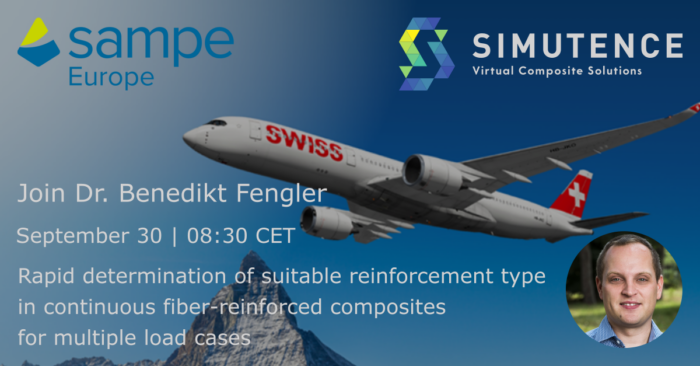
The SAMPE Europe 21 Conference will be held in Baden / Zürich, Switzerland from 29 – 30 September 2021. The event will be organized in a joint co-operation between SAMPE Switzerland and SAMPE Europe. The event will be both LIVE & VIRTUAL.
SIMUNTECE will be part of the show!
Our co-founder Dr. Benedikt Fengler will give a live presentation on the “Rapid determination of suitable reinforcement type in continuous fiber-reinforced composites for multiple load cases” on September 30, 2021, in the 08:30 – 10:00 (CET) session.
Abstract
Concerning their extraordinary weight-specific mechanical properties, continuous-fiber-reinforced plastics (CoFRP) have drawn increasing attention for use in load-bearing structures. Significant effort has been carried out concerning optimizing CoFRP-components for maximum structural performance. Besides conventional optimization techniques, e.g. topology or thickness optimization, CoFRPs offer further potential for tailoring to lightweight requirements: Apart from a choice of fiber and matrix material, the inherently anisotropic behavior gives additional design freedom for engineering, e.g. fiber orientation and stacking sequence. Despite the high lightweight potential, determining a robust optimum with CoFRPs is a great challenge, especially, when multiple load cases need to be considered. This work proposes a numerical analysis of principal stresses in multiple load cases to assess the lightweight potential when applying CoFRPs. Three common layups are considered: quasi-isotropic (QI), bidirectional (BD), and unidirectional (UD) reinforcement. Principal stresses and their directions are obtained in Finite Element simulations. In the extension of previous work, an algorithm is presented which methodologically determines the most suitable layup type and orientation for each element across all considered load cases: Thereby, regions are identified, in which UD, BD, or QI, respectively, are most favorable. Subsequently, each element per region is accordingly updated with new material properties, the simulations are rerun and the evaluation procedure is repeated until convergence. The multi-load-case optimization results are compared against separate optimization of each load case and found to give meaningful results. The methodology is demonstrated using two generic geometries and one real-world load-bearing component. It is found to reliably allocate the most beneficial reinforcement types with low computational effort compared to iterative parameter optimization algorithms and is thus deemed to facilitate a lean part and process design under consideration of multiple load cases.
Register now and listen to his talk!
Case Study
If you are not able to attend the show, please do not hesitate to check out our case study, in which we are also showing some of the details:
Any questions?
Do not hesitate to get in contact with us if you have any questions or if you are interested in a collaboration. We are pleased if you leave us a message!
